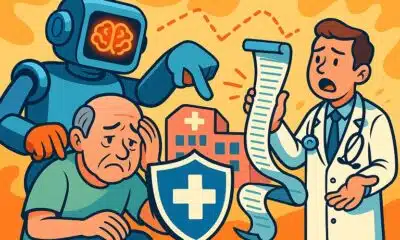Kaiser Health News
RFK Jr.’s Campaign of Conspiracy Theories Is PolitiFact’s 2023 Lie of the Year
Madison Czopek, PolitiFact and Katie Sanders, PolitiFact
Wed, 27 Dec 2023 10:00:00 +0000
As pundits and politicos spar over whether Robert F. Kennedy Jr.’s presidential campaign will factor into the outcome of the 2024 election, one thing is clear: Kennedy’s political following is built on a movement that seeks to legitimize conspiracy theories.
His claims decrying vaccines have roiled scientists and medical experts and stoked anger over whether his work harms children. He has made suggestions about the cause of covid-19 that he acknowledges sound racist and antisemitic.
Bolstered by his famous name and family’s legacy, his campaign of conspiracy theories has gained an electoral and financial foothold. He is running as an independent — having abandoned his pursuit of the Democratic Party nomination — and raised more than $15 million. A political action committee pledged to spend between $10 million and $15 million to get his name on the ballot in 10 states.
Even though he spent the past two decades as a prominent leader of the anti-vaccine movement, Kennedy rejects a blanket “anti-vax” label that he told Fox News in July makes him “look crazy, like a conspiracy theorist.”
But Kennedy draws bogus conclusions from scientific work. He employs “circumstantial evidence” as if it is proof. In TV, podcast, and political appearances for his campaign in 2023, Kennedy steadfastly maintained:
- Vaccines cause autism.
- No childhood vaccines “have ever been tested in a safety study pre-licensing.”
- There is “tremendous circumstantial evidence” that psychiatric drugs cause mass shootings, and the National Institutes of Health refuses to research the link out of deference to pharmaceutical companies.
- Ivermectin and hydroxychloroquine were discredited as covid-19 treatments so covid vaccines could be granted emergency use authorization, a win for Big Pharma.
- Exposure to the pesticide atrazine contributes to gender dysphoria in children.
- Covid-19 is “targeted to attack Caucasians and Black people. The people who are most immune are Ashkenazi Jews and Chinese.”
For Kennedy, the conspiracies aren’t limited to public health. He claims “members of the CIA” were involved in the assassination of his uncle, John F. Kennedy. He doesn’t “believe that (Sirhan) Sirhan’s bullets ever hit my father,” former Attorney General Robert F. Kennedy. He insists the 2004 presidential election was stolen from Democratic candidate John Kerry.
News organizations, including PolitiFact, have documented why those claims, and many others, are false, speculative, or conspiracy-minded.
Kennedy has sat for numerous interviews and dismissed the critics, not with the grievance and bluster of former President Donald Trump, but with a calm demeanor. He amplifies the alleged plot and repeats dubious scientific evidence and historical detail.
Will his approach translate to votes? In polls since November of a three-way matchup between President Joe Biden, Trump, and Kennedy, Kennedy pulled 16% to 22% of respondents.
Kennedy’s movement exemplifies the resonance of conspiratorial views. Misinformers with organized efforts are rewarded with money and loyalty. But that doesn’t make the claims true.
Robert F. Kennedy Jr.’s campaign based on false theories is PolitiFact’s 2023 Lie of the Year.
How an Environmental Fighter Took Up Vaccines
Kennedy, the third of 11 children, was 9 when he was picked up on Nov. 22, 1963, from Sidwell Friends School in Washington, D.C., because Lee Harvey Oswald had shot and killed Uncle Jack. He was 14 when he learned that his father had been shot by Sirhan Sirhan following a victory speech after the California Democratic presidential primary.
RFK Jr., who turns 70 in January, wouldn’t begin to publicly doubt the government’s findings about the assassinations until later in his adulthood.
As a teenager, he used drugs. He was expelled from two boarding schools and arrested at 16 for marijuana possession. None of that slowed an elite path through higher education, including Harvard University for his bachelor’s degree and the University of Virginia for his law degree.
He was hired as an assistant district attorney in Manhattan in 1982 but failed the bar exam and resigned the next year. Two months later, he was arrested for heroin possession after falling ill on a flight. His guilty plea involved a drug treatment program, a year of probation, and volunteer work with a local anglers’ association that patrolled the Hudson River for evidence of pollution that could lead to lawsuits.
Kennedy’s involvement with Hudson Riverkeeper and the Natural Resources Defense Council ushered in a long chapter of environmental litigation and advocacy.
An outdoorsman and falconer, Kennedy sued companies and government agencies over pollution in the Hudson River and its watershed. (He joined the New York bar in 1985.) He earned a master’s degree in environmental law at Pace University, where he started a law clinic to primarily assist Riverkeeper’s legal work. He helped negotiate a 1997 agreement that protected upstate New York reservoirs supplying New York City’s drinking water.
In 1999, Kennedy founded the Waterkeeper Alliance, an international group of local river and bay-keeper organizations that act as their “community’s coast guard,” he told Vanity Fair in 2016. He stayed with the group until 2020, when he left “to devote himself, full-time, to other issues.”
On Joe Rogan’s podcast in June, Kennedy said that virtually all of his litigation involved “some scientific controversy. And so, I’m comfortable with reading science and I know how to read it critically.”
PolitiFact did not receive a response from Kennedy’s campaign for this story.
He became concerned about mercury pollution from coal-burning power plants; methylmercury can build up in fish, posing a risk to humans and wildlife. As he traveled around the country, he said, women started appearing in the front rows of his mercury lectures.
“They would say to me in kind of a respectful but vaguely scolding way, ‘If you’re really interested in mercury contamination exposure to children, you need to look at the vaccines,’” Kennedy told Rogan, whose show averages 11 million listeners an episode.
Kennedy said the women sounded “rational” as they explained a link between their children’s autism and vaccines. “They weren’t excitable,” he said. “And they had done their research, and I was like, ‘I should be listening to these people, even if they’re wrong.’”
He did more than listen. In June 2005, Rolling Stone and Salon co-published Kennedy’s article “Deadly Immunity.” Kennedy told an alarming story about a study that revealed a mercury-based additive once used in vaccines, thimerosal, “may have caused autism in thousands of kids.” Kennedy alleged that preeminent health agencies — the Centers for Disease Control and Prevention, the Food and Drug Administration, the World Health Organization — had colluded with vaccine manufacturers “to conceal the data.”
Kennedy’s premise was decried as inaccurate and missing context. He left out the ultimate conclusion of the 2003 study, by Thomas Verstraeten, which said “no consistent significant associations were found between [thimerosal-containing vaccines] and neurodevelopmental outcomes.”
Kennedy didn’t clearly state that, as a precaution, thimerosal was not being used in childhood vaccines when his article was published. He also misrepresented the comments of health agency leaders at a June 2000 meeting, pulling certain portions of a 286-page transcript that appeared to support Kennedy’s collusion narrative.
Scientists who have studied thimerosal have found no evidence that the additive, used to prevent germ growth, causes harm, according to a CDC FAQ about thimerosal. Unlike the mercury in some fish, the CDC says, thimerosal “doesn’t stay in the body, and is unlikely to make us sick.” Continued research has not established a link between thimerosal and autism.
By the end of July 2005, Kennedy’s Salon article had been appended with five correction notes. In 2011, Salon retracted the article. It disappeared from Rolling Stone.
Salon’s retraction was part of a broader conspiracy of caving “under pressure from the pharmaceutical industry,” Kennedy told Rogan. The then-Salon editor rejected this, saying they “caved to pressure from the incontrovertible truth and our journalistic consciences.”
Kennedy has not wavered in his belief: “Well, I do believe that autism does come from vaccines,” he told Fox News’ Jesse Watters in July.
David Remnick, editor of The New Yorker, interviewed Kennedy for a July story. Noting that Kennedy was focusing more on vaccine testing rather than outright opposition, Remnick asked him whether he was having second thoughts.
“I’ve read the science on autism and I can tell you, if you want to know,” Kennedy said. “David, you’ve got to answer this question: If it didn’t come from the vaccines, then where is it coming from?”
How Covid-19 Helped RFK Jr.’s Vaccine-Skeptical Crusade
In 2016, Kennedy launched the World Mercury Project to address mercury in fish, medicines, and vaccines. In 2018, he created Children’s Health Defense, a legal advocacy group that works “aggressively to eliminate harmful exposures,” its website says.
Since at least 2019, Children’s Health Defense has supported and filed lawsuits challenging vaccination requirements, mask mandates, and social media companies’ misinformation policies (including a related lawsuit against Facebook and The Poynter Institute, which owns PolitiFact).
From the beginning, the group has solicited stories about children “injured” by environmental toxins or vaccines. This year, it launched a national bus tour to collect testimonials. The organization also produces documentary-style films and books, including Kennedy’s “The Wuhan Cover-Up and the Terrifying Bioweapons Arms Race” and “The Real Anthony Fauci: Bill Gates, Big Pharma, and the Global War on Democracy and Public Health.”
In 2020, Children’s Health Defense and the anti-vaccine movement turned attention to the emerging public health crisis.
Kolina Koltai, a senior researcher at Bellingcat, an investigative journalism group, had seen anti-vaccine groups try to seize on Zika and Ebola outbreaks, with little success. But the covid-19 pandemic provided “the exact scenario” needed to create mass dissent: widespread fear and an information vacuum.
Children’s Health Defense published articles in March and April 2020 claiming the “viral terror” was an attempt to enact the “global immunization agenda” and a “dream come true” for dictators. The group echoed these points in ads and social media posts and grew its audience, including in Europe.
On X, then known as Twitter, Children’s Health Defense outperformed news outlets that met NewsGuard’s criteria for trustworthiness from the third quarter of 2020 to the fourth quarter of 2021, according to a report by the German Marshall Fund think tank, even as Children’s Health Defense published debunked information about covid-19 and vaccines.
In 2019, Children’s Health Defense reported it had $2.94 million in revenue, and paid Kennedy a $255,000 salary. Its revenue grew 440% through 2021, according to IRS filings, hitting $15.99 million. Kennedy’s salary increased to $497,013. (Its 2022 form 990 for tax disclosure is not yet public. Kennedy has been on leave from the organization since he entered the presidential race in April.)
On social media, the message had limits. Meta removed Kennedy’s personal Instagram account in February 2021 for spreading false claims about covid-19 and vaccines, the company said, but left his Facebook account active. A year and a half later, Meta banned Children’s Health Defense’s main Facebook and Instagram accounts for “repeatedly” violating its medical misinformation policies. Several state chapters still have accounts.
As the group’s face, Kennedy became a leader of a movement opposed to masks and stay-at-home orders, said David H. Gorski, managing editor of Science-Based Medicine and a professor of surgery and oncology at the Wayne State University School of Medicine.
“The pandemic produced a new generation of anti-vaxxers who had either not been prominent before or who were not really anti-vax before,” Gorski said. “But none of them had the same cultural cachet that comes with being a Kennedy that RFK Jr. has.”
Rallying a crowd before the Lincoln Memorial on Jan. 23, 2022, Kennedy protested covid-19 countermeasures alongside commentator Lara Logan and anti-vaccine activist Robert Malone. The crowd held signs reading “Nuremberg Trials 2.0” and “free choice, no masks, no tests, no vax.” When Kennedy took the stage, mention of his role with Children’s Health Defense prompted an exuberant cheer.
In his speech, Kennedy invoked the Holocaust to denounce the “turnkey totalitarianism” of a society that requires vaccinations to travel, uses digital currency and 5G, and is monitored by Microsoft Corp. co-founder Bill Gates’ satellites: “Even in Hitler’s Germany, you could cross the Alps into Switzerland. You could hide in an attic like Anne Frank did.”
Days later, facing criticism from his wife, the actor Cheryl Hines, Jewish advocacy groups, and Holocaust memorial organizations, Kennedy issued a rare apology for his comments.
Asked about his wife’s comment on Dec. 15 on CNN, he said his remarks were taken out of context but that he had to apologize because of his family.
Recycle. Repeat. Repeat.
When he’s asked about his views, Kennedy calmly searches his rhetorical laboratory for recycled talking points, selective research findings, the impression of voluminous valid studies, speculation, and inarguable authority from his experience. He refers to institutions, researchers, and reports, by name, in quick succession, shifting points before interviewers can note what was misleading or cherry-picked.
There is power in repetition. Take his persistent claim that vaccines are not safety-tested.
- In July, he told “Fox & Friends,” “Vaccines are the only medical product that is not safety-tested prior to licensure.”
- On Nov. 7 on PBS NewsHour, Kennedy said vaccines are “the only medical product or medical device that is allowed to get a license without engaging in safety tests.”
- On Dec. 15, he told CNN’s Kasie Hunt that no childhood vaccines have “ever been tested in a safety study pre-licensing.”
This is false. Vaccines, including the covid-19 vaccines, are tested for safety and effectiveness before they are licensed. Researchers gather initial safety data and information about side effects during phase 1 clinical trials on groups of 20 to 100 people. If no safety concerns are identified, subsequent phases rely on studies of larger numbers of volunteers to evaluate a vaccine’s effectiveness and monitor side effects.
Kennedy sometimes says that some vaccines weren’t tested against inactive injections or placebos. That has an element of truth: If using a placebo would disadvantage or potentially endanger a patient, researchers might test new vaccines against older versions with known side effects.
But vaccines are among “the most tested and vetted” pharmaceutical products given to children, said Patricia Stinchfield, a pediatric nurse practitioner and the president of the National Foundation for Infectious Diseases.
Kennedy encourages parents to research questions on their own, saying doctors and other experts are invariably compromised.
“They are taking as gospel what the CDC tells them,” Kennedy said on Bari Weiss’ “Honestly” podcast in June.
Public health agencies have been “serving the mercantile interests of the pharmaceutical companies, and you cannot believe anything that they say,” Kennedy said.
Experts fret that the Kennedy name carries weight.
“When he steps forward and he says the government’s lying to you, the FDA is lying to you, the CDC is lying to you, he has credence, because he’s seen as someone who is a product of the government,” said Paul Offit, a pediatrics professor in the Children’s Hospital of Philadelphia’s infectious diseases division and the director of the hospital’s Vaccine Education Center. “He’s like a whistleblower in that sense. He’s been behind the scenes, so he knows what it looks like, and he’s telling you that you’re being lied to.”
Kennedy name-drops studies that don’t support his commentary. When speaking with Rogan, Kennedy encouraged the podcaster’s staff to show a particular 2010 study that found that exposure to the herbicide atrazine caused some male frogs to develop female sex organs and become infertile.
Kennedy has repeatedly invoked that frog study to support his position that “we should all be looking at” atrazine and its impact on human beings. The researcher behind the study told PolitiFact in June that Kennedy’s atrazine claims were “speculation” given the vast differences between humans and amphibians. No scientific studies in humans link atrazine exposure to gender dysphoria.
In July, Kennedy floated the idea that covid-19 could have been “ethnically targeted” to “attack Caucasians and Black people. The people who are most immune are Ashkenazi Jews and Chinese.” The claim was ridiculously wrong, but Kennedy insisted that it was backed by a July 2020 study by Chinese researchers. That study didn’t find that Chinese people were less affected by the virus. It said one of the virus’s receptors seemed to be absent in the Amish and in Ashkenazi Jews and theorized that genetic factors might increase covid-19 severity.
Five months later, Kennedy invoked the study and insisted he was right: “I can understand why people were disturbed by those remarks. They certainly weren’t antisemitic. … I was talking about a true study, an NIH-funded study.”
“I wish I hadn’t said them, but, you know, what I said was true.”
Kennedy answered using scientific terms (“furin cleave,” “ACE2 receptor”), but he ignored explanations found in the study. He didn’t account for how the original virus has evolved since 2020, or how the study emphasized these potential mutations were rare and would have little to no public health impact.
Public health experts say that racial disparities in covid-19 infection and mortality — in the U.S., Black and Hispanic people often faced more severe covid-19 outcomes — resulted from social and economic inequities, not genetics.
Kennedy says “circumstantial evidence” is enough.
Antidepressants are linked to school shootings, he told listeners on a livestream hosted by Elon Musk. The government should have begun studying the issue years ago, he said, because “there’s tremendous circumstantial evidence that those, like SSRIs and benzos and other drugs, are doing this.”
Experts in psychiatry have told PolitiFact and other fact-checkers that there is no causal relationship between antidepressants and shootings. With 13% of the adult population using antidepressants, experts say that if the link were true they would expect higher rates of violence. Also, the available data on U.S. school shootings shows most shooters were not using psychiatric medicines, which have an anti-violence effect.
Conspiracy Theories, Consequences, and a Presidential Campaign
The anti-censorship candidate frames his first bid for public office as a response to “18 years” of being shunned for his views — partly by the government, but also by private companies.
“You’re protected so much from censorship if you’re running for president,” Kennedy told conservative Canadian podcaster and psychologist Jordan Peterson in June.
In June, Kennedy’s Instagram account was reinstated — with a verified badge noting he is a public figure. Meta’s rules on misinformation do not apply to active political candidates. (PolitiFact is a partner of Meta’s Third Party Fact-Checking Program, which seeks to reduce false content on the platform.)
In July, he was invited to testify before the Republican-led House Select Subcommittee on the Weaponization of the Federal Government. He repeated that he had “never been anti-vax,” and railed against the Biden White House for asking Twitter to remove his January 2021 tweet that said Baseball Hall of Famer Hank Aaron’s death was “part of a wave of suspicious deaths among elderly,” weeks after Aaron, 86, received a covid-19 vaccine. The medical examiner’s office said Aaron died from unrelated natural causes.
Throughout 2023, alternative media has embraced Kennedy. He has regularly appeared on podcasts such as Peterson’s, and has also participated in profiles by mainstream TV, online, and print sources.
“You’re like, ‘But you’re talking right now. I’m listening to you. I hear your words. You’re not being censored,’” said Whitney Phillips, an assistant professor in the School of Journalism and Communication at the University of Oregon who researches how news media covers conspiracy theories and their proponents. “But a person can believe they’re being censored because they’ve internalized that they’re going to be,” or they know making the claim will land with their audience.
Time will tell whether his message resonates with voters.
Kyle Kondik, managing editor of Sabato’s Crystal Ball at the University of Virginia Center for Politics, said Kennedy may be a “placeholder” for voters who are dissatisfied with Trump and Biden and will take a third option when offered by pollsters.
The only 2024 candidate whose favorability ratings are more positive than negative? It’s Kennedy, according to FiveThirtyEight. However, a much higher percentage of voters are unfamiliar with him than they are with Trump or Biden — about a quarter — and Kennedy’s favorability edge has decreased as his campaign has gone on.
Nevertheless, third-party candidates historically finish with a fraction of their polling, Kondik said, and voters will likely have more names and parties on their fall ballots, including philosopher Cornel West, physician Jill Stein, and a potential slate from the No Labels movement.
Kennedy was popular with conservative commentators before he became an independent, and he has avoided pointedly criticizing Trump, except on covid-19 lockdowns. When NBC News asked Kennedy in August what he thought of Trump’s 2020 election lies, Kennedy said he believed Trump lost, but that, in general, people who believe elections were stolen “should be listened to.” Kennedy is one of them. He still says that the 2004 presidential election was “stolen” from Kerry in favor of Republican George W. Bush, though it wasn’t.
American Values 2024 will spend up to $15 million to get Kennedy’s name on the ballot in 10 states including Arizona, California, Indiana, New York, and Texas. Those are five of the toughest states for ballot access, said Richard Winger, co-editor of Ballot Access News.
Four of Kennedy’s siblings called Kennedy’s decision to run as an independent “dangerous” and “perilous” to the nation. “Bobby might share the same name as our father, but he does not share the same values, vision or judgment,” the group wrote in a joint statement.
Kennedy brushes it off when asked, saying he has a large family and some members support him.
On her podcast, Weiss asked whether Kennedy worried his position on autism and vaccines would cloud his other positions and cost him votes. His answer ignored his history.
“Show me where I got it wrong,” he said, “and I’ll change.”
In a campaign constructed by lies, that might be the biggest one.
PolitiFact researcher Caryn Baird contributed to this report.
PolitiFact’s source list can be found here.
——————————
By: Madison Czopek, PolitiFact and Katie Sanders, PolitiFact
Title: RFK Jr.’s Campaign of Conspiracy Theories Is PolitiFact’s 2023 Lie of the Year
Sourced From: kffhealthnews.org/news/article/rfk-kennedy-politifact-lie-of-year-2023-autism-vaccines/
Published Date: Wed, 27 Dec 2023 10:00:00 +0000
Kaiser Health News
Trump Team’s Reworking Delays Billions in Broadband Build-Out
Millions of Americans who have waited decades for fast internet connections will keep waiting after the Trump administration threw a $42 billion high-speed internet program into disarray.
The Commerce Department, which runs the massive Broadband Equity, Access, and Deployment Program, announced new rules in early June requiring states — some of which were ready to begin construction later this year — to solicit new bids from internet service providers.
The delay leaves millions of rural Americans stranded in places where health care is hard to access and telehealth is out of reach.
“This does monumental harm to rural America,” said Christopher Ali, a professor of telecommunications at Penn State.
The Biden-era program, known as BEAD, was hailed when created in 2021 as a national plan to bring fast internet to all, including millions in remote rural areas.
A yearlong KFF Health News investigation, with partner Gray Media’s InvestigateTV, found nearly 3 million people live in mostly rural counties that lack broadband as well as primary care and behavioral health care providers. In those same places, the analysis found, people live sicker and die earlier on average.
The program adopts a technology-neutral approach to “guarantee that American taxpayers obtain the greatest return on their broadband investment,” according to the June policy notice. The program previously prioritized the use of fiber-optic cable lines, but broadband experts like Ali said the new focus will make it easier for satellite-internet providers such as Elon Musk’s Starlink and Amazon’s Kuiper to win federal funds.
“We are going to connect rural America with technologies that cannot possibly meet the needs of the next generation of digital users,” Ali said. “They’re going to be missing out.”
Republicans have criticized BEAD for taking too long, and Commerce Secretary Howard Lutnick vowed in March to get rid of its “woke mandates.” The revamped “Benefit of the Bargain BEAD Program,” which was released with a fact sheet titled “Ending Biden’s Broadband Burdens,” includes eliminating some labor and employment requirements and obligations to perform climate analyses on projects.
The requirement for states to do a new round of bidding with internet service providers makes it unclear whether states will be able to connect high-speed internet to all homes, said Drew Garner, director of policy engagement at the Benton Institute for Broadband & Society.
Garner said the changes have caused “pure chaos” in state broadband offices. More than half the states have been knocked off their original timeline to deliver broadband to homes, he said.
The change also makes the program more competitive for satellite companies and wireless providers such as Verizon and T-Mobile, Garner said.
Garner analyzed in March what the possible increase in low-Earth-orbit satellites would mean for rural America. He found that fiber networks are generally more expensive to build but that satellites are more costly to maintain and “much more expensive” to consumers.
Commerce Secretary Lutnick said in a June release that the new direction of the program would be efficient and deliver high-speed internet “at the right price.” The National Telecommunications and Information Administration, the Commerce Department agency overseeing BEAD, declined to release a specific amount it hopes to save with the restructuring.
The NTIA also declined to respond on the record to questions about program revisions and delays.
More than 40 states had already begun selecting companies to provide high-speed internet and fill in gaps in underserved areas, according to an agency dashboard created to track state progress.
In late May, the website was altered and columns showing the states that had completed their work with federal regulators disappeared. Three states — Delaware, Louisiana, and Nevada — had reached the finish line and were waiting for the federal government to distribute funding.
The tracker, which KFF Health News saved in March, details the steps each state made in their years-long efforts to create location-based maps and bring high-speed internet to those missing service. West Virginia had completed selection of internet service providers and a leaked draft of its proposed plan shows the state was set to provide fiber connections to all homes and businesses.
Sen. Shelley Moore Capito (R-W.Va.) praised removal of some of the hurdles that delayed implementation and said she thought her state would not have to make very many changes to existing plans during a call with West Virginia reporters.
West Virginia’s broadband council has worked aggressively to expand in a state where 25% of counties lack high-speed internet and health providers, according to KFF Health News’ analysis.
In Lincoln County, West Virginia, Gary Vance owns 21 acres atop a steep ridge that has no internet connection. Vance, who sat in his yard enjoying the sun on a recent day, said he doesn’t want to wait any longer.
Vance said he has various medical conditions: high blood sugar, deteriorating bones, lung problems — “all kinds of crap.” He’s worried about his family’s inability to make a phone call or connect to the internet.
“You can’t call nobody to get out if something happens,” said Vance, who also lacks running water.
KFF Health News, using data from federal and academic sources, found more than 200 counties — with large swaths in the South, Appalachia, and the remote West — lack high-speed internet, behavioral health providers, and primary care doctors who serve low-income patients on Medicaid. On average, residents in those counties experienced higher rates of diabetes, obesity, chronically high blood pressure, and cardiovascular disease.
The gaps in telephone and internet services didn’t cause the higher rates of illness, but Ali said it does not help either.
Ali, who traveled rural America for his book “Farm Fresh Broadband: The Politics of Rural Connectivity,” said telehealth, education, banking, and the use of artificial intelligence all require fast download and upload speeds that cannot always be guaranteed with satellite or wireless technology.
It’s “the politics of good enough,” Ali said. “And that is always how we’ve treated rural America.”
Fiber-optic cables, installed underground or on poles, consistently provide broadband speeds that meet the Federal Communications Commission’s requirements for broadband download speed of 100 megabits per second and 20 Mbps upload speed. By contrast, a national speed analysis, performed by Ookla, a private research and analytics company, found that only 17.4% of Starlink satellite internet users nationwide consistently get those minimum speeds. The report also noted Starlink’s speeds were rising nationwide in the first three months of 2025.
In March, West Virginia’s Republican governor, Patrick Morrisey, announced plans to collaborate with the Trump administration on the new requirements.
Republican state Del. Dan Linville, who has been working with Morrisey’s office, said his goal is to eventually get fiber everywhere but said other opportunities could be available to get internet faster.
In May, the West Virginia Broadband Enhancement Council signaled it preferred fiber-optic cables to satellite for its residents and signed a unanimous resolution that noted “fiber connections offer the benefits of faster internet speeds, enhanced data security, and the increased reliability that is necessary to promote economic development and support emerging technologies.”
KFF Health News is a national newsroom that produces in-depth journalism about health issues and is one of the core operating programs at KFF—an independent source of health policy research, polling, and journalism. Learn more about KFF.
Subscribe to KFF Health News’ free Morning Briefing.
This article first appeared on KFF Health News and is republished here under a Creative Commons license.
The post Trump Team’s Reworking Delays Billions in Broadband Build-Out appeared first on kffhealthnews.org
Note: The following A.I. based commentary is not part of the original article, reproduced above, but is offered in the hopes that it will promote greater media literacy and critical thinking, by making any potential bias more visible to the reader –Staff Editor.
Political Bias Rating: Center-Left
This article adopts a generally critical stance toward the Trump administration’s handling of the broadband program, emphasizing delays and negative consequences for rural communities. It highlights concerns from experts and advocates for fiber-optic technology, portraying the Biden-era BEAD program positively while critiquing the Trump-era restructuring as harmful to rural Americans. The tone and framing focus on social equity and government responsibility to underserved areas, which align with Center-Left perspectives prioritizing infrastructure investment and rural access. However, the article also presents viewpoints from Republican officials and notes bipartisan concerns, maintaining a level of balance overall.
Kaiser Health News
Have Job-Based Health Coverage at 65? You May Still Want To Sign Up for Medicare
When Alyne Diamond fell off a horse in August 2023 and broke her back, her employer-based health plan through UnitedHealthcare covered her emergency care in Aspen, Colorado. It also covered related pain management and physical therapy after she returned home to New York City. The bills totaled more than $100,000.
The real estate lawyer, now 67, was eligible for Medicare at the time but hadn’t enrolled. Since she was still working, she thought her employer health insurance plan would cover her.
That misunderstanding has had financial repercussions that she continues to deal with today.
More than a year after her riding accident, Diamond was back at the emergency room after she tripped on a step while entering a New York restaurant. Her face covered in blood, Diamond was examined by staff, who did multiple CT scans. The bill for that care: $12,000.
This time, though, the insurance coverage wasn’t routine. Nearly all her claims were denied.
Diamond was caught in a fairly common coverage snag: People who have group health insurance when they become eligible for Medicare sometimes find themselves on the hook for their medical bills because their group plan stops paying.
Diamond contacted several people at UnitedHealthcare before she found out why the insurer refused to pay her claims.
When Diamond turned 65 in 2022, Medicare — unbeknownst to her — became the “primary payer” for her claims, meaning the federal health program for older or disabled people was supposed to take the lead in covering her medical bills, before other insurers paid anything. (As secondary payer, Diamond’s employer policy picked up 20% of what Medicare would have paid.)
Had she signed up for the government insurance plan when she turned 65, Diamond could have avoided a financially perilous situation that left her unexpectedly responsible for the medical costs she incurred during that time.
She began to understand what had happened as she made inquiries about the denied claims.
Diamond said she was told that UnitedHealthcare audited her claims last year and determined it had been improperly paying for her care, perhaps because her pricey medical claims after her fall from the horse raised a red flag.
The insurer not only stopped paying current claims but also moved to claw back tens of thousands of dollars it had paid to providers in the two years since she turned 65. Some of those providers are now seeking payment from her.
“It’s horrifying,” she said. “For about two months I was devastated. I thought, ‘Where am I going to get the money to pay all these people? There goes my retirement.’”
The mistake has already cost her $25,000 and may cost her much more if providers continue to bill her for amounts that UnitedHealthcare has clawed back for care she received before signing up for Medicare in February.
A UnitedHealthcare spokesperson declined to provide an on-the-record statement, citing safety concerns.
Patient advocates say they frequently hear from people who, like Diamond, thought they didn’t need to sign up for Medicare upon turning 65 because they had group health coverage.
That assumption is generally correct if they or their spouse is working at a company with at least 20 employees. In that case, employer coverage is considered primary and they can delay signing up for Medicare as long as they or their spouse continues to be employed there.
But if someone has employer coverage through a company with fewer than 20 workers, Medicare generally becomes the primary payer when they turn 65. The real estate law firm at which Diamond is a partner has a handful of employees.
Similarly, if someone is older than 65 and has retiree health coverage or has left their job and opted to continue their employer coverage under the Consolidated Omnibus Budget Reconciliation Act, also known as COBRA, Medicare pays first. The issue can also arise for people who are younger than 65 if they are eligible for Medicare because of a disability. In those instances, Medicare pays first if they or their family member works at a company with fewer than 100 employees.
If people in these groups don’t sign up for Medicare when they become eligible, they can find themselves responsible for all their medical bills for years. (They may also owe a penalty for late enrollment in the Medicare program.)
“It’s very alarming and there’s no current fix to the situation,” said Fred Riccardi, president of the New York-based Medicare Rights Center, a national patient advocacy organization.
The Centers for Medicare & Medicaid Services did not respond to a request for comment.
Mark Scherzer, a lawyer in Germantown, New York, who helps people with insurance problems, and who advised Diamond, said he gets calls a couple of times a month from people who face this issue.
“What I see constantly now is that insurers go back and they claw back the money from the doctor and the doctor then claws the money back from the patient,” he said.
Costly claims may trigger an insurer to examine someone’s coverage.
Those big claims “seem to get on the insurer’s radar,” said Casey Schwarz, senior counsel for education and federal policy at the Medicare Rights Center.
UnitedHealthcare has recouped over $50,000 in medical bills from some of the providers who treated Diamond in New York after her riding accident. She’s paid them about $25,000 so far. Some have agreed to let her pay the amount Medicare would have paid.
But there may be more bills to come. Under New York law, health plans have two years after claims are paid to claw back payments from providers, and providers have three years to sue patients for medical debt. So, while there is still time for Diamond to be billed, the clock will eventually run out.
Diamond plans to sue the broker who manages her company’s health plan and other benefits for negligence.
“The Medicare secondary payment rules basically say that if you didn’t sign up because you didn’t know Medicare was supposed to be primary, that’s on you,” said Melanie Lambert, senior Medicare advocate at the Center for Medicare Advocacy in Connecticut.
Lambert said she has seen the issue “many, many times.” In some instances, if a beneficiary can demonstrate they were misled by an employer or a federal employee, they may qualify for relief or a special enrollment period, she said.
In a 2023 letter to the acting secretary of the Department of Labor, the National Association of Insurance Commissioners advocated applying a “commonsense rule to COBRA plans, individual health insurance, and other coverage sources: those entitled to Medicare Part B but not enrolled in it should not lose benefits they pay for from a non-Medicare coverage source.”
The Department of Labor didn’t respond to a request for comment.
In earlier times, people started collecting Social Security benefits then automatically got Medicare when they turned 65.
Now, enrolling in Medicare is more complicated for many people, said Tricia Neuman, a senior vice president and the executive director of the Program on Medicare Policy at KFF, a health information nonprofit that includes KFF Health News.
“As more people are delaying going on Social Security and delaying going on Medicare, there’s more opportunities for people to make mistakes, and those mistakes are costly,” Neuman said.
Coverage experts say there are no clear requirements for insurers, employers, or the federal government to notify people about how the payment rules governing coordination of benefits between health plans may change when they become eligible for Medicare.
The information appears in a chart in the government’s “Medicare & You” handbook, if someone knows to look for it. But it is not easy to find.
A straightforward fix could solve many of the problems people face in this area, Scherzer said. Since every health plan knows its enrollees’ ages, why not require them to notify people approaching 65 of possible benefit coordination issues with Medicare? “It’s so simple and such a no-brainer.”
KFF Health News is a national newsroom that produces in-depth journalism about health issues and is one of the core operating programs at KFF—an independent source of health policy research, polling, and journalism. Learn more about KFF.
Subscribe to KFF Health News’ free Morning Briefing.
This article first appeared on KFF Health News and is republished here under a Creative Commons license.
The post Have Job-Based Health Coverage at 65? You May Still Want To Sign Up for Medicare appeared first on kffhealthnews.org
Note: The following A.I. based commentary is not part of the original article, reproduced above, but is offered in the hopes that it will promote greater media literacy and critical thinking, by making any potential bias more visible to the reader –Staff Editor.
Political Bias Rating: Centrist
This content provides a detailed and fact-based account of the complexities and pitfalls associated with Medicare enrollment and coordination of benefits with employer health plans. The tone is neutral, focusing on patient experiences, insurance practices, and systemic challenges without advocating for specific partisan policies. It presents information from multiple stakeholders, including patient advocates, insurers, and government entities, aiming to inform readers rather than promote a political agenda. Such balanced reporting aligns with a centrist perspective that highlights practical issues in healthcare administration without ideological bias.
Kaiser Health News
The Price You Pay for an Obamacare Plan Could Surge Next Year
MIAMI — Josefina Muralles works a part-time overnight shift as a receptionist at a Miami Beach condominium so that during the day she can care for her three kids, her aging mother, and her brother, who is paralyzed.
She helps her mother feed, bathe, and give medicine to her adult brother, Rodrigo Muralles, who has epilepsy and became disabled after contracting covid-19 in 2020.
“He lives because we feed him and take care of his personal needs,” said Josefina Muralles, 41. “He doesn’t say, ‘I need this or that.’ He has forgotten everything.”
Though her husband works full time, the arrangement means their household income is just above the federal poverty line — too high to qualify for Florida’s Medicaid program but low enough to make Muralles and her husband eligible for subsidized health insurance through the Affordable Care Act marketplace, also known as Obamacare.
Next year, Muralles said, she and her husband may not be able to afford that health insurance coverage, which has paid for her prescription blood thinners, cholesterol medication, and two surgeries, including one to treat a genetic disorder.
Extra subsidies put in place during the pandemic — which reduced the premiums Muralles and her husband paid by more than half, to $30 a month — are in place only through Dec. 31. Without enhanced subsidies, Affordable Care Act insurance premiums would rise by more than 75% on average, with bills for people in some states more than doubling, according to estimates from KFF, a health information nonprofit that includes KFF Health News.
Florida and Texas would be hit especially hard, as they have more people enrolled in the marketplace than other states. Some of their congressional districts alone, especially in South Florida, have more people signed up for Obamacare than entire states.
Like many of the more than 24 million Americans enrolled in the insurance marketplace this year, Muralles was unaware that the enhanced subsidies are slated to expire. She said she cannot afford a premium hike because inflation has already eaten into her household’s budget.
“The rent is going up,” she said. “The water bill is going up.”
Low-income enrollees like the Muralles couple would see the biggest percentage increases in premiums if enhanced subsidies expire.
Middle-income enrollees who earn more than four times the federal poverty line would no longer be eligible for subsidies at all. Those middle-income enrollees (who earn at least $62,600 for a single person in 2025) are disproportionately older, self-employed, and living in rural areas.
Julio Fuentes, president of the Florida State Hispanic Chamber of Commerce, said many of his organization’s members are small business owners who rely on Obamacare for health coverage.
“It’s either this or nothing,” he said.
The Congressional Budget Office estimated that letting the enhanced subsidies expire would, by 2034, increase the number of people without health insurance by 4.2 million. In tandem with changes to Medicaid in the House of Representatives’ reconciliation bill and the Trump administration’s proposed rules for the marketplace, including toughening income verification and shortening enrollment periods, it would increase the number of uninsured people by 16 million over that time period.
A study by the Urban Institute, a nonprofit think tank, found that Hispanic and Black people would see greater coverage losses than other groups if the extra subsidies lapse.
Fuentes noted that about 5 million Hispanics are enrolled in the ACA marketplace, and that Donald Trump won the Hispanic vote in Florida in 2024. He hopes the president and congressional Republicans see extending the enhanced subsidies as a way to hold on to those voters.
“This is probably a good way, or a good start, to possibly grow that base even more,” he said.
Enrollment in the marketplace has grown faster since 2020 in the states won by Trump in 2024. A recent KFF survey found that 45% of Americans who buy their own health insurance identify as or lean Republican, including 3 in 10 who identify as Make America Great Again supporters. Smaller shares identify as Democrats or Democratic-leaning independents (35%) or do not lean toward either party (20%).
Kush Desai, a White House spokesperson, said the rules proposed by the Trump administration, combined with the provisions in the House-passed budget bill, would “strengthen the ACA marketplace.” He noted that the CBO projects the legislation would reduce premiums for some plans about 12% on average by 2034 — but out-of-pocket costs would rise or remain the same for most subsidized ACA consumers.
“Democrats know Americans broadly support ending waste, fraud, and abuse, as The One, Big, Beautiful Bill does, which is why they are desperately trying to change the conversation,” Desai said.
But Lauren Aronson, executive director of Keep Americans Covered, a group in Washington, D.C., representing health insurers, hospitals, physicians, and patient advocates, said it is critical to raise awareness about the likely impact of losing the enhanced subsidies, which are also known as advanced premium tax credits. She is encouraged that Democrats have proposed legislation to extend the enhanced tax credits, and that some Republican senators have voiced support.
What worries Aronson most is that the Republican-controlled Congress is more focused on extending tax cuts than enhanced subsidies, she said. The current bill extending the 2017 tax cuts would increase the federal deficit by about $2.4 trillion over the next decade, according to the CBO, while making the enhanced subsidies permanent would increase the deficit by $358 billion over roughly the same period.
“Congress is moving forward on a tax reconciliation package that purports to benefit working families,” Aronson said. “But if you don’t take care of the tax credits, working families will be left holding the bag.”
Brian Blase, president of Paragon Health Institute, a conservative health policy think tank, said the enhanced subsidies were supposed to be a temporary measure during the covid-19 pandemic to help people at risk of losing coverage.
Instead, he said, the enhanced subsidies facilitated fraud because enrollees did not need to verify their income eligibility to receive zero-premium plans if they reported incomes at or near the federal poverty level.
The enhanced subsidies also worsen health inflation, discourage employers from offering health insurance benefits, and crowd out alternative models, such as short-term insurance and Farm Bureau plans, Blase said.
“Permitting these subsidies to expire would just be going back to Obamacare as it was written,” Blase said. “That is a more efficient program than the program that we have now.”
New rules for the marketplace proposed by the Trump administration in March are already designed to address fraud, said Anna Howard, a policy expert with the American Cancer Society Cancer Action Network, which advocates for increased health insurance coverage. Howard said extending the enhanced tax credits would help ensure that people who are legitimately eligible for coverage can get it.
“We don’t want to see over 5 million people be kicked off their health insurance coverage out of fears of fraud when the policies being proposed don’t necessarily address fraud,” she said.
Without affordable premiums, many consumers will turn to short-term health plans, health care cost-sharing ministries, and other forms of coverage that do not have the benefits or protections of the health law, she said.
“These are plans that don’t provide coverage for prescription drugs, or they have lifetime and annual limits,” she said. “For a cancer patient, those plans don’t work.”
Though the enhanced subsidies do not expire until the end of the year, the Blue Cross Blue Shield Association would prefer Congress to act by fall to avoid confusion during open enrollment, said David Merritt, a senior vice president. Insurers are preparing rates to meet state deadlines. By October, consumers will receive 60-day plan renewal notices with their 2026 premiums.
Without enhanced subsidies, Merritt said, competition in the marketplace will wither, leading to fewer coverage options and higher prices, especially in states that have not expanded Medicaid eligibility and where Obamacare enrollment spiked during the past four years, like Florida and Texas. “Voters and patients are really going to see the impact,” he said.
Republican and Democratic representatives for some of the Florida congressional districts with the highest numbers of people in the marketplace did not respond to repeated interview requests.
Muralles, of North Miami, Florida, said she wants her representatives to work in the interest of constituents like herself, who need health insurance coverage to care for their families.
“Now is the time to prove to us that they are with us,” Muralles said. “When everybody’s healthy, everybody goes to work, everybody can pay taxes, everybody can have a better life.”
KFF Health News is a national newsroom that produces in-depth journalism about health issues and is one of the core operating programs at KFF—an independent source of health policy research, polling, and journalism. Learn more about KFF.
Subscribe to KFF Health News’ free Morning Briefing.
This article first appeared on KFF Health News and is republished here under a Creative Commons license.
The post The Price You Pay for an Obamacare Plan Could Surge Next Year appeared first on kffhealthnews.org
Note: The following A.I. based commentary is not part of the original article, reproduced above, but is offered in the hopes that it will promote greater media literacy and critical thinking, by making any potential bias more visible to the reader –Staff Editor.
Political Bias Rating: Center-Left
The content primarily advocates for the continuation of enhanced subsidies under the Affordable Care Act, highlighting the potential negative impacts on low- and middle-income Americans if these subsidies expire. It includes voices concerned about healthcare affordability and coverage losses, emphasizing the human and economic consequences. While it does present perspectives from conservative sources criticizing the subsidies and noting fraud concerns, the overall tone and framing favor sustaining or expanding government healthcare support, which aligns with center-left policy priorities. The article avoids overt partisan rhetoric, aiming for a balanced but slightly progressive leaning on health policy matters.
-
News from the South - Texas News Feed6 days ago
Texas Army sergeant’s wife deported to Honduras
-
Mississippi Today3 days ago
Lawmaker probing Mississippi’s prisons finds inmates suffering from treatable diseases as corrections asks for more money
-
News from the South - North Carolina News Feed6 days ago
Enjoying the I-26 widening project? Great, because it won’t be over until July 2027 — if it stays on schedule • Asheville Watchdog
-
News from the South - Tennessee News Feed3 days ago
New laws to take effect in Tennessee July 1 – The Tennessee Tribune
-
News from the South - Georgia News Feed3 days ago
Juneteenth celebrations march on in Georgia amid national DEI reversals and cutbacks
-
News from the South - Louisiana News Feed5 days ago
Northgate Mall sold for redevelopment – The Current
-
News from the South - Kentucky News Feed6 days ago
Report: Childhood trauma costs Kentucky nearly $300 million every year
-
News from the South - Missouri News Feed6 days ago
A crowd saw a man get shot. Decades later, nobody claims to know who did it















































